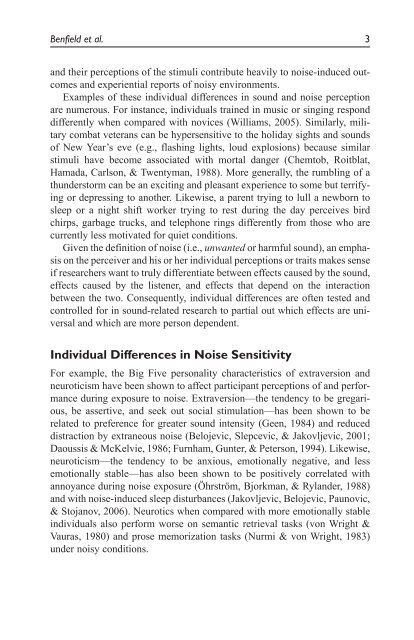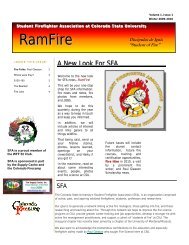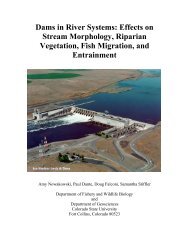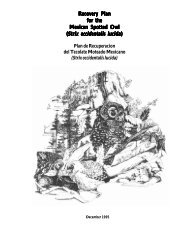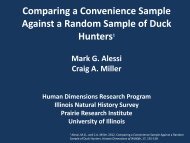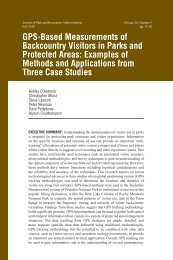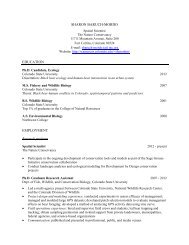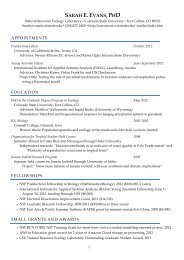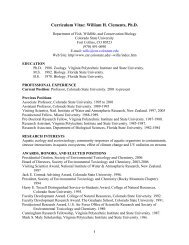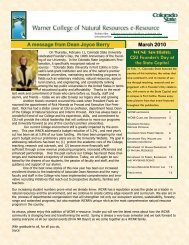Benfield, J.A., Nurse, G.A., Jakubowski, R., Gibson, A., Taff, D ...
Benfield, J.A., Nurse, G.A., Jakubowski, R., Gibson, A., Taff, D ...
Benfield, J.A., Nurse, G.A., Jakubowski, R., Gibson, A., Taff, D ...
You also want an ePaper? Increase the reach of your titles
YUMPU automatically turns print PDFs into web optimized ePapers that Google loves.
<strong>Benfield</strong> et al. 3<br />
and their perceptions of the stimuli contribute heavily to noise-induced outcomes<br />
and experiential reports of noisy environments.<br />
Examples of these individual differences in sound and noise perception<br />
are numerous. For instance, individuals trained in music or singing respond<br />
differently when compared with novices (Williams, 2005). Similarly, military<br />
combat veterans can be hypersensitive to the holiday sights and sounds<br />
of New Year’s eve (e.g., flashing lights, loud explosions) because similar<br />
stimuli have become associated with mortal danger (Chemtob, Roitblat,<br />
Hamada, Carlson, & Twentyman, 1988). More generally, the rumbling of a<br />
thunderstorm can be an exciting and pleasant experience to some but terrifying<br />
or depressing to another. Likewise, a parent trying to lull a newborn to<br />
sleep or a night shift worker trying to rest during the day perceives bird<br />
chirps, garbage trucks, and telephone rings differently from those who are<br />
currently less motivated for quiet conditions.<br />
Given the definition of noise (i.e., unwanted or harmful sound), an emphasis<br />
on the perceiver and his or her individual perceptions or traits makes sense<br />
if researchers want to truly differentiate between effects caused by the sound,<br />
effects caused by the listener, and effects that depend on the interaction<br />
between the two. Consequently, individual differences are often tested and<br />
controlled for in sound-related research to partial out which effects are universal<br />
and which are more person dependent.<br />
Individual Differences in Noise Sensitivity<br />
For example, the Big Five personality characteristics of extraversion and<br />
neuroticism have been shown to affect participant perceptions of and performance<br />
during exposure to noise. Extraversion—the tendency to be gregarious,<br />
be assertive, and seek out social stimulation—has been shown to be<br />
related to preference for greater sound intensity (Geen, 1984) and reduced<br />
distraction by extraneous noise (Belojevic, Slepcevic, & Jakovljevic, 2001;<br />
Daoussis & McKelvie, 1986; Furnham, Gunter, & Peterson, 1994). Likewise,<br />
neuroticism—the tendency to be anxious, emotionally negative, and less<br />
emotionally stable—has also been shown to be positively correlated with<br />
annoyance during noise exposure (Öhrström, Bjorkman, & Rylander, 1988)<br />
and with noise-induced sleep disturbances (Jakovljevic, Belojevic, Paunovic,<br />
& Stojanov, 2006). Neurotics when compared with more emotionally stable<br />
individuals also perform worse on semantic retrieval tasks (von Wright &<br />
Vauras, 1980) and prose memorization tasks (Nurmi & von Wright, 1983)<br />
under noisy conditions.


